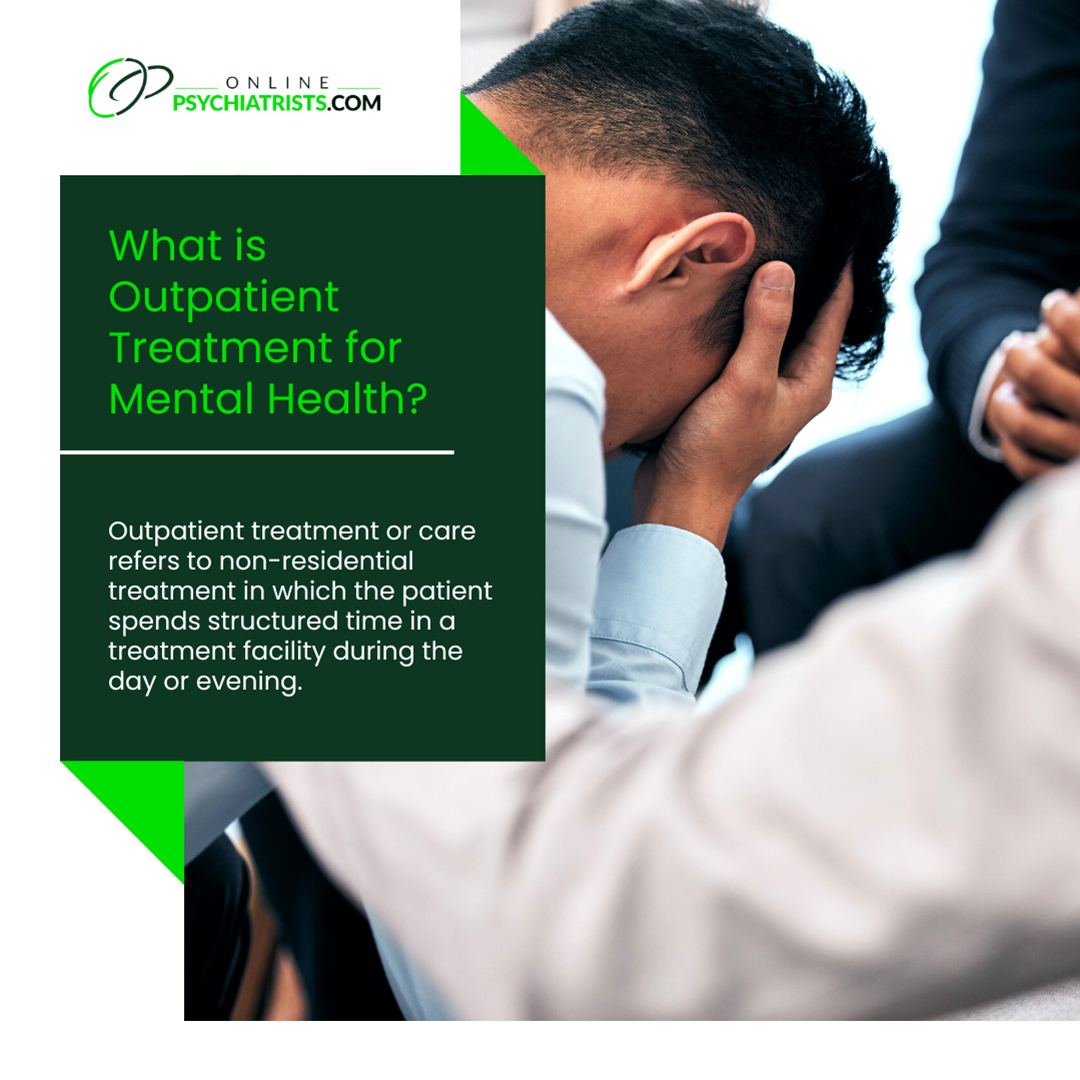

Outpatient treatment gives you a chance to resolve your mental health issues or drug or alcohol addiction around your work, school, and other life responsibilities while you live at home. It is not one specific type of treatment but a general term for treatment that takes place in an office, hospital, or clinical setting. For patients who do not need round-the-clock care, outpatient treatment is an excellent option. Call Online Psychiatrists to find out more about the type of treatment that would suit your mental health condition best. Dr. Zlatin Ivanov focuses on patients who require immediate mental health care and determines which types of outpatient treatment can support your recovery.
If you or a loved one is struggling with mental health problems, seeking treatment may be the best choice. There are an overwhelming number of treatment types based on the mental issues and disorders, treatments, and services available and how these treatment plans and programs are delivered.
Read more: The 7 Best Over-The-Counter Anxiety Medications Out There
Outpatient treatment or care refers to non-residential treatment in which the patient spends structured time in a treatment facility during the day or evening. Outpatient mental health programs offer the same quality of treatment as inpatient programs but with more freedom and flexibility.
You can look forward to a helpful, therapeutic environment and quality treatment that fits your needs and health requirements. It helps individuals recover from substance use disorders, trauma, or mental health conditions but in an outpatient setting, in which they can return home each night.
People may choose to participate in outpatient mental health treatment for the following reasons:
Outpatient care is a common way of treatment for many mental health problems due to its lower cost, better flexibility to patients’ needs and schedules, and a large selection of providers. It is only recommended when constant support is unnecessary, and the patients benefit from being in their environment to experience stressors and learn to cope with professional guidance.
Like other treatment programs, outpatient mental health treatment can be customized to every patient’s needs. The nature and severity of the person’s symptoms will determine how much and what kind of care they need. The outpatient treatment approach is usually most successful for people with eating disorders, depression, and anxiety.

There are many outpatient mental health programs, but there is no one-size-fits-all formula. Most of these programs are customized to meet the specific needs of each individual and involve a combination of individual therapy, group therapy, family therapy, medication management, and aftercare.
There are three main types of outpatient programs, each with varying levels of structure. The healthcare provider will determine which type of outpatient treatment program will be most beneficial to the patient.
Standard outpatient program - It involves regular visits to the outpatient clinic, treatment center, or hospital as outlined by the patient’s personalized care plan. Therapy sessions are structured and scheduled around the patient’s work, school, and other responsibilities. Treatment may be weekly or more frequent and continue for a year or more, depending on the therapy needs.
Intensive outpatient programs (IOPs) – These programs call for 2 to 4 hours of treatment for up to 5 days a week. They are designed to provide more structure and support as compared to standard outpatient programs while giving patients the time and flexibility to fulfill their outside responsibilities too. An IOP can last anywhere from a few weeks to a year, but 90 days is the minimum recommended time.
Other benefits of attending an IOP are:
IOPS works best for patients transitioning from a higher level of care. They are also ideal for those who do not need detox or are not in danger of harming themselves or others.
Partial hospitalization programs (PHPs) – They involve 6 or more hours of treatment per day, for up to 7 days a week. With proper supervision and comprehensive structure, these programs offer the most intensive level of non-residential care and benefit patients who integrate back into their lives after an inpatient stay. PHPs usually last 30 days before the patient can transition into a more flexible level of care.
Outpatient mental health treatment aims to help patients thrive outside the therapeutic environment. It focuses on managing symptoms, identifying triggers, overcoming fears, developing communication skills, and establishing healthy social norms that enable patients to live a better quality of life.
Outpatient treatment is an ideal choice for people with mild to moderate symptoms, a strong support system at home, and the ability to function independently.
With outpatient treatment, patients get a chance to:
Most outpatient treatment programs work with patients to help them achieve optimal mental health. The best programs are those that work, but working with a licensed and experienced provider ensures you get the best care to get control over your life.
In outpatient treatment, patients learn to cope with stressors and manage their mental health. Outpatient treatment works by offering mental health care to people as they need it. While one person may be able to manage symptoms with an hour or two of mental health treatment every month, another person may require more support and structure.
Mental health services available in outpatient treatment settings include:
Treatment can range from short-term counseling to long-term plans that can be customized to provide the best treatment to each patient, as needed.
Yes. Some insurance companies may cover outpatient therapy. You must check if your insurance provider covers the type of outpatient therapy you are considering by calling your insurance and seeking in-network facilities.
You can also check with outpatient therapy institutes, and they will verify insurance and provide upfront costs. The best thing about choosing outpatient therapy is that it costs less than traditional residential treatment. Also, if a patient is denied residential coverage, an IOP could be a more affordable and flexible option.
Outpatient treatment programs are highly beneficial for people who seek to achieve long-term sobriety. They are less intensive than traditional outpatient programs, yet they focus on crucial skill development for real-world scenarios.
They also enable patients undergoing mental health treatment to be a part of individualized and group therapies during residential treatment. IOP is the best outpatient program that offers weekly therapy and is an excellent alternative to PHP or residential treatments.
Consult your healthcare provider to learn more about an outpatient program that would work best for you or a loved one and set the wheels in motion for desired results. Seeking treatment for mental health issues can be both exhilarating and terrifying, as it can change a lot of things.
If you are struggling with mental illness or addiction, seek medical guidance. Dr. Zlatin Ivanov understands that every person seeking mental health support has unique symptoms and circumstances. He focuses on creating personalized treatment plans that meet each patient’s needs. Dr. Ivanov manages your symptoms by recommending therapies and medications to manage your emotional and behavioral issues successfully. He may recommend outpatient treatment depending on your symptoms and mental health condition to ensure you regain your life and get back to what you love doing.

Dr. Zlatin Ivanov, MD, is an adult psychiatrist specializing in addiction treatment, ADHD, anxiety, depression, and OCD. He offers exceptional talk therapy and medication management through online video conferencing.
Dr. Ivanov is double board certified in Psychiatry and Clinical Neurology and a member of the American Psychiatric Association. His medical career is colored by many outstanding contributions to medicine, including several publications, research, and scientific presentations. An attending psychiatrist at Woodhull Medical Center in Brooklyn, NY, and Bellevue Hospital Center in New York City, he takes the time to listen to patients and makes sure they know he is committed to their unique situation.
 Our Locations
Our Locations
The Chrysler Building
405 Lexington Ave, #2601
New York, NY, 10174 (map)
300 Carnegie Center Drive #150K,
Princeton, NJ, 08540 (map)
701 Brickell Avenue, 1550#A,
Miami, FL, 33131 (map)